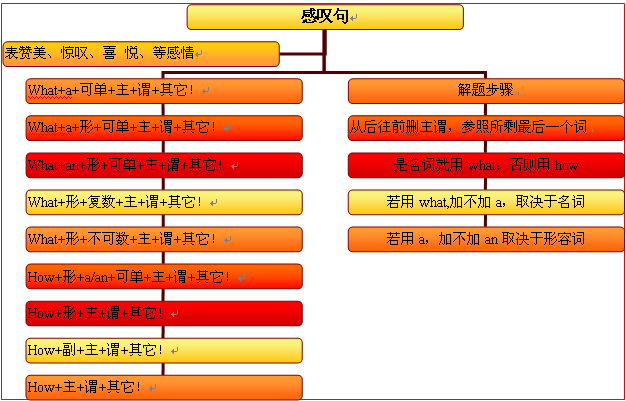本试题 “________ different life today is from ________ was fifty years ago![ ]A. What a; whatB. How; whatC. What; whatD. What a; how” 主要考查您对感叹句
宾语从句
等考点的理解。关于这些考点您可以点击下面的选项卡查看详细档案。
- 感叹句
- 宾语从句
感叹句的概念:
感叹句是表示喜怒哀乐等情感的句子。感叹句一般用how或what开头。How作状语,修饰修饰形容词、副词、或句子。what作定语,修饰名词(名词前可有形容词或冠词)。感叹句要用降调,句末用感叹号。
感叹句的几种常用形式:
一、How+形容词〔或副词〕+S+V…!
如:How boring this is! 这实在太无趣了!
How beautifully you sing! 你唱得真美妙!
How well she remembered the first time she had seen him! 她把初见他的那幕情景记得好清楚呀!
注:有时会将形容词或副词省略。
如:How you've changed! 你的变化真大!
二、What a[an]+形容词+名词+S+V…!
如:What a bad cough he has! 他咳得好历害!
What a voyage they had! 他们这段航行经验真是太完美〔可怕〕了!
注:这类句子若无形容词,则须就上下文来判断形容词为何。
如:What a man he is! 那家伙算什么!
What a business it is moving house! 搬家这件事真够受的!
另外,若名词为不可数或复数的话,就不能用不定冠词。
如:What bad weather we're having! 多讨厌的天气!
What fun it will be when we all go on holiday together. 我们大家一起去度假那可太有意思了。
What lovely flowers they are! 好美的花朵啊!
三、How+形容词+a[an]+名词+S+V…!
如:How kind a man he is! 他这个人真好!
注:感叹句的省略用法 How lucky (I am)! 我是多么地幸运啊!
如:What a strange man(he is)! 好奇怪的人啊!
What a pity (it is) that you can't come with us! 你不能和我们一起来,真是可惜啊!
How careless(it is) of him to make such a mistake! 他是不小心,才会犯下这种错误!
感叹句知识体系:

特殊的感叹句表达形式:
1、以副词here, there, in开头的感叹句。
如:Here comes the bus! 公共汽车来了!
There they are! 他们在那儿呢!
2、以疑问词who开头,表示惊奇。
如:Who else will read such a book! 谁还会读这样的书!
3、以情态动词may开头,表示愿望。
如:May you both be happy! 祝二位幸福。
May you succeed! 祝你成功!
4、否定疑问句用作感叹句时,它的意义是肯定的;但肯定疑问句用作感叹句在美国英语中比较常见。
如:Aren't they sweet! 他们多可爱啊!
Am I hungry! 我饿极了!
5、一些短语用作感叹句。
如:Dear me! 哎呀!
My goodness! 嗳呀!
None of your nonsense! 不要胡说了!
6、一些作表语的成分用作感叹句。
如:Just my luck! 又倒霉了!
Sorry, my mistake! 对不起,是我的错!
7、以从句表示的感叹句。
如:As if were my fault! 好像是我的错似的!
To think as candal of this sort should be going on under my roof! 真想不到这种丑事竟然出在我们家里!
宾语从句的概念:
置于动词、介词等词性后面起宾语作用的从句叫宾语从句。宾语从句的语序必须是陈述语序。谓语动词、介词、动词不定式,v.-ing形式后面都能带宾语从句。有些形容词(afraid, sure, glad等)之后也可以带宾语从句。
宾语从句的用法:
1、宾语从句的引导词:
宾语从句通常由连词that和whether(if)、连接代词或连接副词以及关系代词型what引导:
如:We believe that he is honest. 我们相信他是诚实的。
I don't know whether he'll arrive in time. 我不知道他是否能及时到。
I don't know who(m) you mean. 我不知道你指谁。
He asked why he had to go alone. 他问他为什么必须一个人去。
Please tell me which you like. 告诉我你喜欢哪一个。
She has got what she wanted. 她要的东西得到了。
注:有时介词后可接跟一个宾语从句(但介词后通常不接that和if引导的宾语从句):
如:From what you say, he is right. 根据你所说的,他是对的。
有极个别介词(如but,except)可接that引导的宾语从句:
如:She remembered nothing about him except that his hair was black. 她对他什么都不记得,只记得他的头发是黑的。
2、宾语从句与形式宾语it:
当宾语从句后跟有宾语补足语时,通常在宾语从句处使用形式宾语it,而将真正的宾语从句移至句末:
如:I think it best that you should stay here. 我认为你最好住这儿。
He hasn't made it known when he is going to get married. 他还没宣布他何时结婚。
3、连词that的省略问题:
引导宾语从句的连词that通常可以省略:
如:She said(that) she would come to the meeting. 她说过要来开会的。
I promise you(that) I will be there. 我答应你我会去。
注:有时为了强调,that引导的宾语从句可位于句首,此时that不可省略:
如:That she is a good girl I know. 她是一个好姑娘,我是知道的。
4、宾语从句与否定转移当动词think, believe, suppose, expect, imagine后接一个表示否定意义的宾语从句时,其否定通常转移到主语:
如:I don't suppose that it is true. 我认为那不是真的。
I don't imagine that he will come. 我想他不会
使用宾语从句特别注意:
一、宾语从句的语序:
宾语从句的语序是陈述句语序即:连接代词/副词+主语+谓语+其他成分。
如:I don't know what they are looking for.
Could you tell me when the train will leave?
Can you imagine what kind of man he is?
二、宾语从句的时态:
主句是一般现在时,从句根据实际情况使用任何时态。
句:The headmaster hopes everything goes well.
主句是过去时态,从句须用过去时态的某种形式。
句:She was sorry that she hadn't finished her work on time.
当宾语从句表示的是一个客观真理或者事实时,即使主句是过去时,从句也用一般现在时态。
如:The teacher told his class that light travels faster than sound.
三、宾语从句的特点:
宾语从句可以作及物动词、介词及形容词的宾语。宾语从句的语序一律用陈述句语序。连接词that引导宾语从句在句中无词义,不充当句子成份,多数情况下可以省略。whether和if都可引导宾语从句,但whether后可紧跟or not;whether从句可作介词的宾语。如果从句太长,可以用形式宾语it.
与“________ different life today is from ________ was fifty ...”考查相似的试题有:
- You and I could hardly work together,______?A.could youB.couldn’t IC.couldn’t weD.could we
- ____ girl she is! A. What bright a B. How a bright C. How bright a D. What a bright
- It is usually thought ________ a little child says is truth.A.what thatB.that whatC.whichD.that
- I'll go to see you whenever ___________.[ ]A. you are convenientB. it is convenient for youC. you will be convenientD...
- I will remember the teacher teaches us.[ ]A. thatB. no matterwhatC. whateverD. no matter which
- The way he did it was different _____ we were used to.[ ]A. in whichB. in whatC. from whatD. from which
- The new hospital will be located in _________ used to be a wasteland and a huge shopping mall will also be constructe...
- Alice didn't know _____ made her lose her patience and shout at her brother at that time.[ ]A. what was it thatB. why...
- What an important role the Internet _____ in our life! One can hardly imagine ____ life would be like without it.A.p...
- The teacher asked Jim _______________.A.why was he late for schoolB.why he was late for schoolC.how he was late fo...